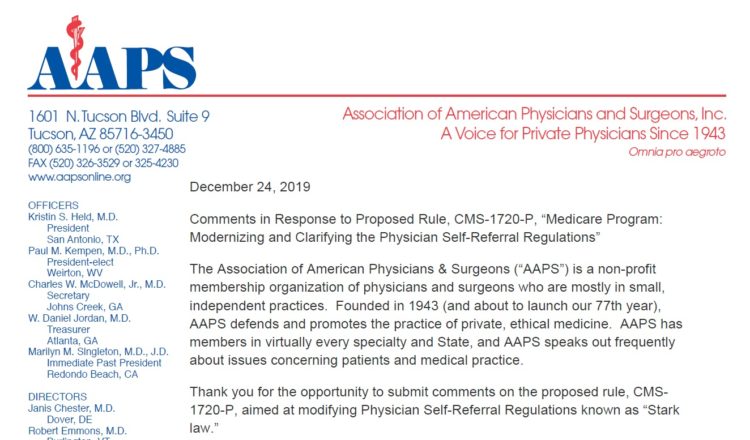Note: similar comments may be submitted by December 31 at https://www.regulations.gov/comment?D=CMS-2018-0082-0394
The Association of American Physicians & Surgeons (“AAPS”) is a non-profit membership organization of physicians and surgeons who are mostly in small, independent practices. Founded in 1943 (and about to launch our 77th year), AAPS defends and promotes the practice of private, ethical medicine. AAPS has members in virtually every specialty and State, and AAPS speaks out frequently about issues concerning patients and medical practice.
Thank you for the opportunity to submit comments on the proposed rule, CMS-1720-P, aimed at modifying Physician Self-Referral Regulations known as “Stark law.”
AAPS generally favors deregulation that simplifies Medicare’s byzantine regulatory structure and that empowers patients and physicians to be free from restrictions and burdens caused by overregulation.
Unfortunately, the proposed rule appears to be adding complexity to Stark law regulation, instead of simplifying it. In addition the arrangements the proposal aims to protect are those that add layers of complexity to the patient-physician relationship instead of fostering a more direct relationship. Such arrangements also generally allow someone other than the patient to define what is of value to the patient and someone besides the patient’s physicians to coordinate care.
Therefore AAPS opposes the proposed rule on general principles.
The rule fails to address the crux of the problems driving up costs and reducing the quality of care. Instead it heightens the trajectory towards more bureaucracy and higher costs. It risks further incentivizing decisions that put the needs of someone other than the patient first.
Instead of a “regulatory sprint” further down a path toward complete top-down micromanagement of American medicine, AAPS would like to respectfully suggest that the opposite is urgently needed.
AAPS has consistently opposed Stark law as an ill-advised patch applied to address underlying flaws in the Medicare program. (For the record, we aren’t merely criticizing the former Rep. Pete Stark’s eponymous legislation due to his disdain for the practice of private medicine, demonstrated when he referred to AAPS as “Neanderthals” on the House floor in 1998. If standing up for the Oath of Hippocrates makes us appear primitive, we will proudly wear that title.)
Medicare’s fundamental flaw has been well outlined elsewhere—for example in the “AAPS White Paper on Medicare Reform”—but it can be summarized by P.J. O’Rourke’s prescient prediction: “If you think health care is expensive now, wait until you see what it costs when it’s free.” The perception that someone else is paying the bill has predictable and empirically reproducible consequences. It is undeniable that pervasive third party payment, for nearly every facet of medical care, has resulted in the cost crisis too many American’s are faced with when seeking care.
Applying additional bandaids on top of a fundamentally unconstitutional federal program that is racing towards insolvency, perhaps as soon as 2026, is bad medicine. Besides being antithetical to a patient-physician relationship rooted in the Hippocratic tradition, the “value based,” “coordinated care” schemes being foisted on patients have shown no indication that they can achieve the unattainable task of restoring Medicare to a sound financial footing and every indication that they will reduce transparency of costs and increase the opacity of conflicts of interest.
So in short, we suggest that the focus of HHS should be doing everything within its authority to address Medicare’s underlying flaws instead of imposing more counterproductive bureaucratic rules.
A crucial aspect of doing so means ending policies that trap patients and physicians in the failing program. When a tower is expected to collapse, it’s time to get people out, not send more people in. Section 11(a) of Executive Order 13890 begins this evacuation by allowing Americans to forego Part A without giving up their Social Security retirement benefits.
Additionally, we hope HHS and CMS will expedite adoption of policies required by Section 11(b) that directs the Secretary to “remove unnecessary barriers to private contracts that allow Medicare beneficiaries to obtain the care of their choice and facilitate the development of market-driven prices.”
In fact, when Medicare patients are allowed to access care outside of the program’s constraints, they often pay less than they would through the system. Take for example the cost of common generic drugs. Part D coverage of many common generics often makes them at least twice as expensive and in many cases three to four, or even five times as expensive as when patients purchase them at near wholesale cost directly from physicians in the 46 states where direct dispense is permitted. Another example is Medicare patients seeking cataract surgery, who can obtain better overall value from ophthalmologists who are opted out of Medicare.
HHS should also focus on other policies that reconnect patients more directly with those caring for them, for example, working to end Stark prohibitions on physician-owned hospitals and encouraging states to repeal Certificate-of-Need laws that are impeding physician innovators from offering patients value through increased access to lower cost, high quality care that is coordinated directly between the patient and physician.
In conclusion, we are thankful for efforts HHS, CMS, and the Administration are making to empower patients and the medical professionals who care for them, while reining in the power of outsiders to control either. However we fear these proposed changes to Stark regulations are a move in the wrong direction. As CMS moves forward, we urge that it keep forefront this key principle voiced by Secretary Azar: “value is best determined by markets and consumers, not arbitrary rules and central planners.”
Sincerely,
Jane M. Orient, M.D., AAPS Executive Director
PDF version click here.




